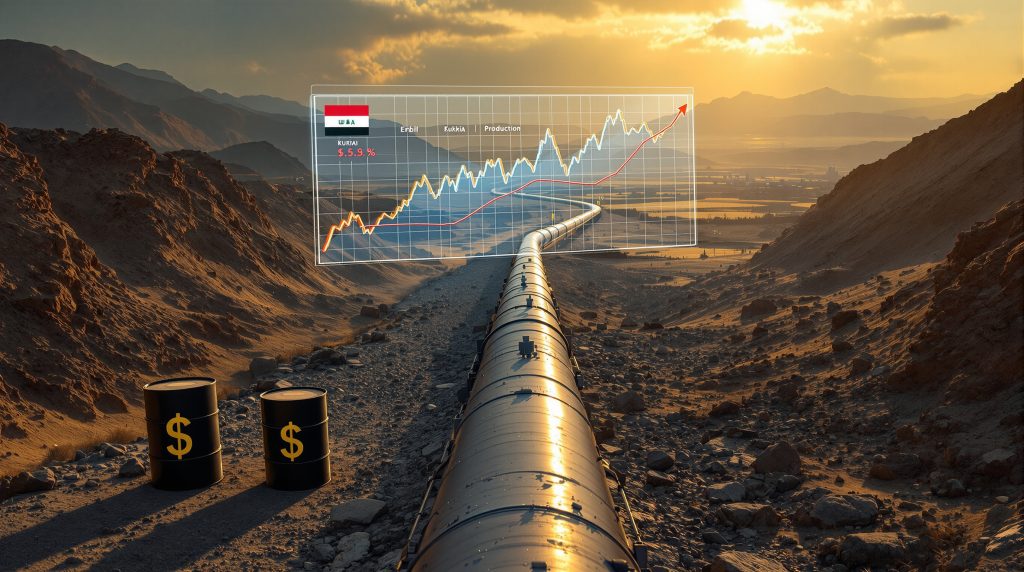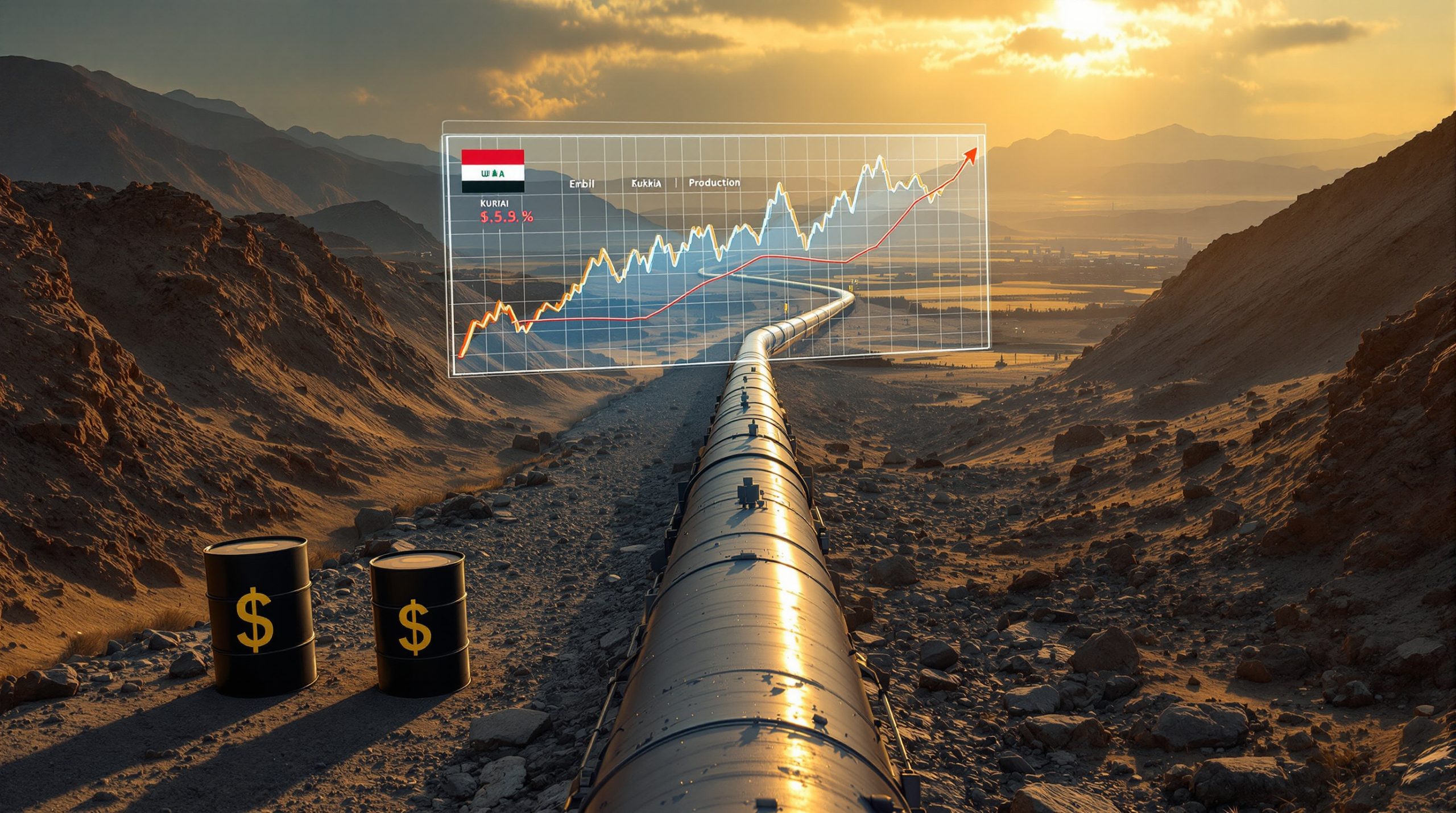Understanding the Kurdistan Oil Export Dispute: A Critical Analysis
The oil export dispute between Iraq's central government and the Kurdistan Regional Government (KRG) represents one of the Middle East's most significant energy conflicts. With control over approximately 450,000 barrels per day of production capacity and an estimated 40-45 billion barrels in reserves, Kurdistan's oil wealth has become the centerpiece of a complex political, legal, and economic struggle that extends far beyond Iraq's borders.
Historical Roots of the Conflict
The foundations of today's dispute were laid during Iraq's post-war reconstruction. Following the 2003 Iraq War, Kurdistan's semi-autonomous status allowed it to begin developing oil resources independently, creating a parallel oil sector outside Baghdad's control.
Iraq's 2005 constitution, intended to establish a framework for resource governance, instead created ambiguity through vague language in Articles 112 and 115. These constitutional provisions failed to clearly delineate authority over natural resources between federal and regional governments.
Taking advantage of this legal gray area, the KRG passed its own regional oil and gas law in 2007. This bold move established the legal basis for Kurdistan to sign production-sharing contracts (PSCs) with international oil companies without Baghdad's approval, fundamentally challenging the central government's authority.
Core Issues Driving the Current Dispute
Revenue Distribution and Fiscal Control
At the heart of the conflict lies the question of who controls Kurdistan's oil wealth. Baghdad maintains that all Iraqi oil must be exported through the federal State Organization for Marketing of Oil (SOMO), with revenues flowing to the central treasury before redistribution.
The KRG counters that it has constitutional rights to manage regional resources and receive fair compensation. Under Iraq's revenue sharing system, Kurdistan is entitled to 17% of the federal budget, but disputes over calculation methods and deductions have frequently disrupted payments.
"The revenue sharing mechanism has been weaponized repeatedly," noted a regional energy consultant familiar with the negotiations. "Without transparent accounting and neutral oversight, suspicion undermines every temporary agreement."
Export Infrastructure: The Pipeline Dilemma
Infrastructure control represents another critical dimension of the dispute. Kurdistan's decision to construct an independent pipeline to Turkey in 2013 fundamentally altered the power dynamics by creating an export route outside federal control.
This 970-kilometer pipeline, with a capacity of 700,000 barrels per day, enabled Kurdistan to bypass Baghdad entirely when exporting to international markets. For nearly a decade, this pipeline served as Kurdistan's economic lifeline, allowing independent oil sales worth billions of dollars annually.
The pipeline's operation became the subject of international arbitration when Baghdad challenged its legality. In March 2023, the International Chamber of Commerce ruled that Turkey had violated its agreement with Iraq by allowing Kurdish oil exports without federal approval, leading to the suspension of exports.
Legal Framework Incompatibility
A fundamental incompatibility exists between Kurdistan's production-sharing contract (PSC) model and Baghdad's technical service contract (TSC) approach.
Kurdistan's PSCs offer international companies a percentage of oil produced (typically 15-25%), allowing potential for significant profits if fields perform well. This attractive model helped the KRG attract substantial investment from international oil companies despite the political risks.
In contrast, Baghdad's TSCs pay fixed fees per barrel produced, limiting profit potential for international operators. This divergence in contract models represents a significant obstacle to integrating Kurdistan's oil operations into the federal system.
U.S. Strategic Interests and Diplomatic Efforts
Energy Security Considerations
The United States maintains significant interests in resolving the Kurdistan oil dispute for both economic and security reasons. U.S. energy companies have invested heavily in Kurdistan's oil sector, with cumulative investments exceeding $4 billion since 2007.
Beyond direct investments, the U.S. views Iraq's oil production stability as essential for global energy security. With total production capacity of approximately 4.5 million barrels per day, Iraq ranks as OPEC's second-largest producer. Kurdistan's 450,000 barrels per day contribution represents a critical component of this output.
Regional Stability Imperatives
From a security perspective, U.S. officials recognize that Kurdistan's economic stability directly impacts regional security dynamics. The KRG relies on oil revenues for approximately 80% of its budget, making export disruptions existentially threatening to its governance capabilities.
"Economic collapse in Kurdistan would create dangerous security vacuums," a former U.S. diplomat noted in a recent policy forum. "After years of partnership in combating ISIS, preventing another crisis that could destabilize the region remains a core U.S. interest."
Diplomatic Engagement Approach
The U.S. has pursued active diplomatic engagement to broker a sustainable resolution. In recent months, high-level State Department officials have conducted shuttle diplomacy between Baghdad and Erbil, focusing on establishing transparent mechanisms for oil export and revenue sharing.
These diplomatic efforts have emphasized three key principles:
- Respecting Iraq's constitutional sovereignty
- Ensuring Kurdistan receives its fair share of oil revenues
- Creating verifiable mechanisms to build mutual trust
Recent Developments and Current Status
Post-Shutdown Agreements and Breakdowns
Following the March 2023 pipeline shutdown, Baghdad and the KRG reached several interim agreements allowing limited resumption of exports through the federal system. However, these arrangements have proven unstable.
In April 2023, an initial agreement allowed approximately 375,000 barrels per day to resume export via SOMO, with revenues directed to a dedicated account at the Iraqi Central Bank for distribution to the KRG. This arrangement collapsed within three months over payment disputes.
Subsequent agreements in August 2023 and January 2024 followed similar patterns, with initial cooperation breaking down over implementation details and accusations of withheld payments.
Economic Impact on Kurdistan
The ongoing export limitations have created severe financial strain in Kurdistan. The KRG has accumulated over $11 billion in debt to creditors, including international oil companies and domestic banks. Public sector salary payments, which employ approximately 60% of Kurdistan's workforce, have faced recurring delays of 2-3 months.
This economic pressure has accelerated brain drain from the region, with an estimated 25,000 professionals leaving since 2023. Investment in critical infrastructure has effectively halted, with capital expenditure reduced by 85% compared to 2019 levels.
Current Status of Negotiations
As of early 2025, U.S.-facilitated discussions between Baghdad and Erbil have focused on establishing:
- A joint technical committee to audit oil production and sales
- An escrow account mechanism with international oversight
- A standardized payment formula to ensure predictable revenue flows
- Legal protections for international oil companies operating in Kurdistan
These negotiations represent the most comprehensive attempt to date to establish a sustainable framework for Kurdistan's oil exports within Iraq's federal system.
International Oil Companies in the Crossfire
Investment Uncertainty and Operational Challenges
International oil companies operating in Kurdistan face mounting challenges due to the export impasse. Since the 2023 pipeline shutdown, at least seven international companies have either divested assets or declared force majeure on operations, representing approximately $2.8 billion in stranded investments.
Companies still operating in the region have reduced production to meet only domestic refining needs, operating at roughly 30% of capacity. This dramatic reduction has frozen most field development activities and caused widespread layoffs among local workers.
Legal Risk Exposure
Companies face significant legal uncertainties regarding their contracts. Baghdad has consistently maintained that all KRG-issued production sharing contracts lack legal validity under federal law, exposing companies to potential legal challenges if they continue operations.
In February 2024, Iraq's Federal Supreme Court issued a ruling declaring all KRG oil contracts signed without federal approval "unconstitutional," intensifying legal risks for remaining operators.
Corporate Response Strategies
Companies have adopted various strategies to manage these complexities:
- Some have attempted to renegotiate contracts to align with federal models
- Others have maintained minimal operations while seeking legal protections
- Several have completely exited Kurdistan, accepting substantial losses
- A few have pursued international arbitration against the KRG for unpaid dues
Proposed Solutions and Pathways Forward
Transparent Revenue Sharing Mechanisms
Current proposals focus on establishing verifiable revenue sharing systems that would allow Kurdistan's oil to be exported through federal channels while ensuring the KRG receives its constitutional allocation.
Key components of these proposals include:
- Real-time production monitoring systems at wellheads and export points
- International bank oversight of revenue collection and distribution
- Automated payment mechanisms triggered by verified export volumes
- Dispute resolution procedures with binding arbitration provisions
Legal Framework Harmonization
Efforts to reconcile Kurdistan's PSC model with Baghdad's TSC approach represent another potential pathway. This would require significant legal engineering to create a hybrid contract system that:
- Preserves existing company rights while acknowledging federal authority
- Establishes transition mechanisms for converting contracts
- Creates grandfathering provisions for early investors
- Develops profit-sharing mechanisms acceptable to both governments
International Oversight Options
Several international oversight mechanisms have been proposed to build trust, including:
- World Bank monitoring of revenue collection and distribution
- International Energy Agency technical verification of production figures
- United Nations oversight of the legal framework implementation
- Establishment of a dedicated multilateral monitoring mission
Global Energy Market Implications
Production Impact Assessment
Kurdistan's 450,000 barrels per day production capacity represents approximately 0.45% of global oil supply. While not large enough to cause major price shocks independently, disruptions contribute to tighter market conditions, particularly for Mediterranean and European refiners who previously relied on Kurdish crude grades.
The distinctive quality of Kurdistan's light, sweet crude made it particularly valuable to certain refineries. Its absence from markets has forced these facilities to secure alternative supplies, often at premium prices, contributing to the recent oil price rally seen in global markets.
Investment Climate Effects
The dispute has significantly damaged Iraq's ability to attract international investment in its broader energy sector. Since 2020, foreign direct investment in Iraq's oil and gas sector has declined by approximately 60%, with investors citing political uncertainty and contract insecurity as primary concerns.
This investment chill extends beyond Kurdistan to federal Iraq, where international companies have grown increasingly cautious about committing capital amid the ongoing institutional struggles over oil governance and OPEC market influence.
Regional Energy Integration Implications
Kurdistan's geographic position makes it potentially valuable for broader regional energy integration. The region could serve as a transit corridor for:
- Natural gas pipelines connecting Iraq's southern fields to European markets
- Oil export routes linking Iran (if sanctions are eventually lifted) to Mediterranean ports
- Electricity transmission networks connecting the Gulf to Turkey and beyond
The unresolved dispute blocks progress on these potential integration projects, limiting regional economic cooperation opportunities, further exacerbating the US oil production decline challenges.
Broader Geopolitical Dimensions
Turkey's Pivotal Position
Turkey occupies a central role in the dispute as both pipeline operator and regional power. Turkish decisions about pipeline operations directly impact Kurdistan's economic viability, giving Ankara significant leverage in regional politics.
Turkey's calculations involve balancing multiple interests:
- Economic benefits from pipeline transit fees (estimated at $500-700 million annually)
- Political relations with Baghdad's central government
- Security concerns regarding Kurdish nationalism
- Energy security considerations as a major importer
The March 2023 decision to comply with the arbitration ruling by halting Kurdish exports via its territory demonstrated Turkey's willingness to prioritize legal compliance and relations with Baghdad over its economic ties with the KRG, according to recent negotiations.
Iran's Regional Influence Considerations
Iran views the resolution of the Kurdistan-Baghdad dispute through the lens of its broader regional influence strategy. A weakened KRG potentially increases Iranian economic and political leverage in Iraq.
Since the pipeline shutdown, Iranian exports to Kurdistan have increased by approximately 35%, creating new economic dependencies. Iran has also expanded political outreach to Kurdish parties, positioning itself as a potential mediator while advancing its own regional interests.
Autonomy Movement Implications
How the oil dispute is resolved could establish precedents for other resource-rich regions seeking greater autonomy within federal systems across the Middle East and beyond.
Regions with significant resource wealth but limited political autonomy are closely monitoring the Kurdistan situation, including:
- Libya's eastern provinces
- Yemen's southern governorates
- Sudan's resource-rich peripheral regions
The balance ultimately struck between federal authority and regional resource rights could influence autonomy movements throughout the region, with implications for global markets already feeling the US-China trade war impact.
Critical Questions About the Dispute's Future
Will a Permanent Export Solution Emerge?
The most pressing question remains whether Baghdad and Erbil can establish a sustainable framework for Kurdistan's oil exports. Previous agreements have collapsed when tested by implementation challenges, raising skepticism about the durability of any new arrangement.
Success likely depends on creating:
- Sufficient international oversight to build trust
- Financial incentives for continued cooperation
- Political costs for abandoning agreements
- Technical systems resistant to manipulation
Can International Oil Companies Return With Confidence?
For international oil companies to reinvest significantly in Kurdistan, they require clear legal protection and stable export pathways. The current legal uncertainty has frozen most major development plans, with companies maintaining only minimal operations.
A comprehensive solution would need to address:
- Legal status of existing contracts
- Export guarantees for future production
- Payment security mechanisms
- Dispute resolution procedures
How Will Regional Power Dynamics Evolve?
The resolution pathway chosen will significantly impact regional power balances. A solution that strengthens Baghdad's control could reduce Kurdish autonomy but potentially create a more unified Iraqi oil policy. Conversely, arrangements preserving significant Kurdish independence in oil matters might strengthen regionalism but create continued tensions with the central government.
Turkey and Iran will calibrate their policies based on the emerging balance, potentially shifting alliances and support depending on which scenario materializes, with significant tariffs economic implications for the broader region.
Disclaimer: This analysis involves forecasts and speculation about complex geopolitical developments. Future outcomes depend on numerous unpredictable political, economic, and security factors. Readers should consider multiple perspectives when evaluating potential scenarios.
Conclusion: A Crossroads for Regional Energy Governance
The Kurdistan oil export dispute represents more than a disagreement over resource control—it embodies fundamental questions about federalism, resource sovereignty, and regional stability in a critical part of the Middle East.
With approximately 30% of Iraq's proven oil reserves and significant natural gas resources at stake, the economic implications extend beyond Iraq's borders to global energy markets and investment patterns. The resolution pathway chosen will shape not only Kurdistan's economic future but also Iraq's ability to function effectively as a federal state.
As U.S.-facilitated negotiations continue, the challenge remains finding a formula that respects Iraq's constitutional integrity while acknowledging Kurdistan's legitimate economic needs and historical aspirations—a balance that has proven elusive despite years of attempted compromises.
Looking to Invest in Emerging Oil Opportunities?
Discover how geopolitical shifts in regions like Kurdistan could create investment opportunities with Discovery Alert's proprietary Discovery IQ model, which delivers real-time alerts on significant ASX mineral discoveries. Explore historic examples of exceptional returns from major discoveries on our dedicated discoveries page.




